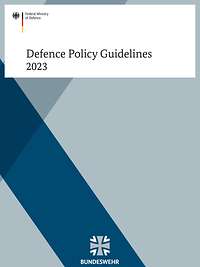
Announcement
New Defence Policy Guidelines call for warfighting capability of the Bundeswehr
First paragraph of the article2023 Defence Policy Guidelines have been published
According to the Guidelines, the core task of the German armed forces is national and collective defence. Personnel and equipment of the Bundeswehr are determined by this task. Our troops must be warfighting-capable to achieve this task, because the threat situation in Europe has taken a dramatic turn since Russia’s illegal attack on Ukraine.
According to the new Defence Policy Guidelines, “a life of peace and freedom can no longer be taken for granted in central Europe.” This is why we must be able to defend our security and freedom together with our allies. For the Bundeswehr, this means “readiness to fight at any time and to achieve success in high-intensity combat.”
At the same time, crises, conflicts and regional tensions are affecting Europe’s immediate security environment in Africa, the Middle East, the Arctic and the Indo-Pacific region. China, for example, “is at once partner, competitor and systemic rival”, the Defence Policy Guidelines state. This is why Germany’s international military commitments must continue to go beyond national and collective defence. This is in line with the provisions of NATONorth Atlantic Treaty Organization’s Strategic Concept and the European Union’s Strategic Compass.
Geostrategic orientation: integrated defence policy
Bundeswehr contributions to international crisis management remain an indispensable element in promoting and supporting stability in the European neighbourhood. Furthermore, the Bundeswehr’s engagement will also be guided by a comprehensive and internationally oriented defence policy. This includes international armed forces cooperation with proven partners on training and exercises, as well as reliable armaments cooperation.
The Bundeswehr is the guarantor of Germany’s deterrence and defence capability. Its core task is national defence, which protects its citizens as well as the sovereignty and territorial integrity of Germany and its allies through firm and reliable integration in collective defence. This requires that military and civilian defence must be combined as total defence.Defence Policy Guidelines 2023
Taking as a basis the National Security Strategy adopted this summer and its security objectives, the 2023 Defence Policy Guidelines draw conclusions for the defence sector. As such, they supplant the 2016 White Paper as well as the 2018 Bundeswehr Concept. In a next step, the provisions of the Defence Policy Guidelines will be translated into a new Bundeswehr Capability Profile and a Military Strategy.
Whole-of-society resilience: increasing robustness
While the Defence Policy Guidelines primarily define objectives for the Bundeswehr structure, they are also directed at everyone in state and society who bears responsibility for the security of Germany as part of the overall defence concept and aims to consolidate the whole-of-government approach to security. The Bundeswehr is a core instrument of our robustness against military threats. But “successful total defence requires the close coordination and cooperation of all relevant stakeholders – state, society and industry – even in peacetime.”

Share content on